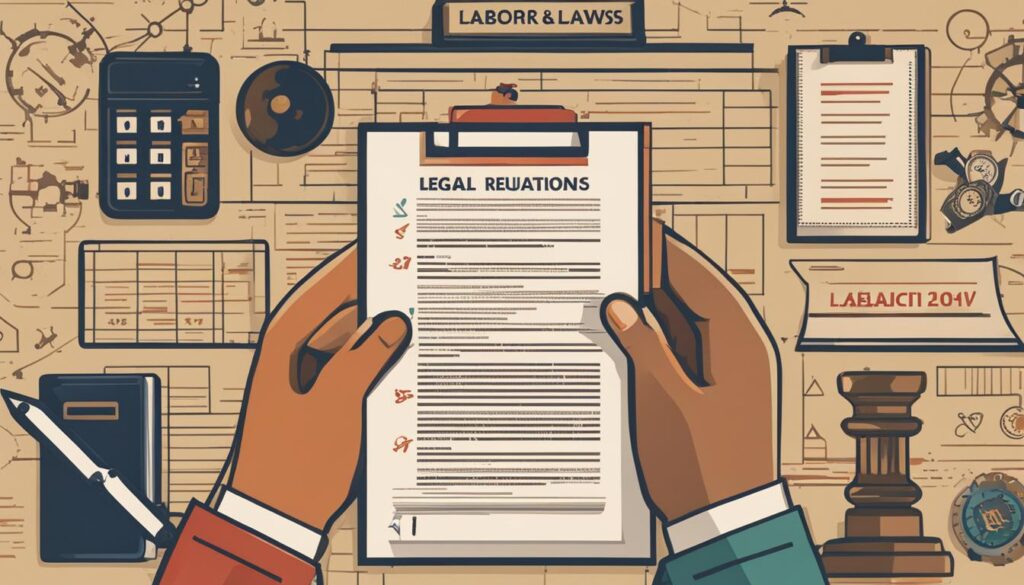A single-member LLC is a business structure that offers the advantages of limited liability while being owned by only one person. Despite the common misconception that single-member LLCs cannot hire employees, it is indeed possible for them to do so. By understanding the legal requirements and following proper procedures, single-member LLCs can successfully hire and manage employees to support the growth of their business.
Key Takeaways:
- Single-member LLCs have the ability to hire employees despite misconceptions.
- Understanding the legal requirements is essential for hiring and managing employees.
- Proper procedures must be followed to ensure compliance with federal and state employment laws.
- By hiring employees, single-member LLCs can expand operations and increase productivity.
- Efficient onboarding and training programs are crucial for creating a supportive work environment.
Understanding Single-Member LLCs and Sole Proprietorships
A single-member LLC and a sole proprietorship have similarities in terms of limited liability. However, it is essential to note the significant differences between these two business structures. While a sole proprietorship does not provide liability protection for the owner’s personal assets, a single-member LLC does.
With a single-member LLC, you can enjoy the advantages of limited liability protection, ensuring that your personal assets are safeguarded if any legal issues arise within the business. This protection creates a distinct advantage for single-member LLCs over sole proprietorships.
Moreover, this liability protection allows single-member LLCs to hire employees without exposing their personal assets to potential risks. Unlike sole proprietorships where the owner assumes all legal and financial responsibility, a single-member LLC separates the owner’s personal and business assets.
This distinction is crucial as it allows single-member LLCs to attract talented employees by providing a more secure work environment. The liability protection serves as an added incentive for individuals seeking job opportunities in the business sector.
In summary, while both single-member LLCs and sole proprietorships offer limited liability, the former provides additional security for the owner’s personal assets. This protection allows single-member LLCs to confidently hire employees and expands their business without compromising their personal financial well-being.
Legal Requirements for Hiring Employees
In order to hire employees for your single-member LLC, it is crucial to understand and fulfill certain legal requirements. By adhering to these obligations, you can ensure compliance with the law and create a solid foundation for your business.
Obtaining an Employer Identification Number (EIN)
The first step in the process is obtaining an Employer Identification Number (EIN) from the Internal Revenue Service (IRS). An EIN is a unique identifier assigned to your business for tax purposes. It is necessary for reporting employment taxes, opening a business bank account, and filing your annual tax returns.
Registering for Federal and State Taxes
As an employer, you are responsible for registering your single-member LLC for federal and state taxes. This includes withholding income taxes from your employees’ wages and making regular tax deposits. It’s important to stay updated on tax rates and any changes in tax laws to ensure full compliance.
Complying with Workers’ Compensation Insurance Requirements
Another important legal requirement is securing workers’ compensation insurance for your employees. Workers’ compensation provides coverage for medical expenses and lost wages in the event of a work-related injury or illness. Compliance with workers’ compensation insurance requirements is essential for protecting both your employees and your business.
Adhering to Minimum Wage and Overtime Laws
You must also comply with minimum wage and overtime laws set by the federal and state governments. It is important to understand the applicable minimum wage rates and ensure proper payment to your employees. Additionally, you must accurately calculate and compensate for any overtime hours worked according to the law.
Staying informed about these legal requirements and seeking guidance from reliable resources, such as the state labor department or an employment attorney, is crucial. They can provide you with the necessary information and assistance to navigate through the complexities of hiring employees for your single-member LLC.

IRS Rules for Single-Member LLCs Hiring Employees
When it comes to hiring employees, single-member LLCs must adhere to specific rules set forth by the IRS. Despite being classified as disregarded entities for tax purposes, single-member LLCs are still required to obtain an employer identification number (EIN) and comply with all federal and state employment laws.
One of the key IRS rules for single-member LLCs is the need for an EIN. An EIN is a unique identifier assigned to businesses for tax administration purposes. It is crucial for accurately reporting employment taxes and withholding taxes from employees’ wages.
Furthermore, single-member LLCs must comply with all federal and state employment laws. This includes ensuring proper withholding and payment of taxes, as well as complying with state-specific employment regulations. By staying up-to-date on these laws, single-member LLCs can avoid penalties and legal complications.
In addition to tax obligations, single-member LLCs must maintain accurate payroll and taxes records. This includes keeping track of income tax withholdings, Social Security and Medicare taxes, unemployment taxes, and any other applicable deductions. Accurate record-keeping is essential for fulfilling reporting requirements and demonstrating compliance with IRS regulations.
Overall, understanding and adhering to IRS rules is essential for single-member LLCs looking to hire employees. By obtaining an EIN, complying with federal and state employment laws, and maintaining accurate payroll and taxes records, single-member LLCs can ensure compliance and avoid potential legal issues.
Key takeaways:
- Single-member LLCs must obtain an employer identification number (EIN) when hiring employees.
- Compliance with federal and state employment laws is necessary for single-member LLCs.
- Accurate record-keeping of payroll and taxes records is crucial for IRS compliance.
Conclusion
Hiring employees for your single-member LLC brings both advantages and disadvantages. One of the key advantages is the opportunity to expand your operations and increase productivity. By bringing in talented individuals, you can delegate tasks, allowing you to focus on important strategic decisions to grow your business. Additionally, having a team of employees can bring fresh ideas and perspectives, leading to innovation and improved problem-solving.
However, it is important to consider the additional paperwork and legal responsibilities that come with hiring employees. As a single-member LLC, you will need to comply with various legal requirements, including obtaining an employer identification number (EIN), ensuring proper tax withholding, and adhering to minimum wage and overtime laws. This administrative burden may require extra time and resources to manage effectively.
To successfully navigate the process of hiring employees for your single-member LLC, it is essential to follow the proper steps. This includes determining the positions you need to fill, conducting thorough interviews and background checks, and carefully considering the fit of each candidate with your company culture and values. Once you have selected the right employees, implementing a comprehensive onboarding and training program is crucial to set your new hires up for success.
By utilizing resources like Gusto’s platform, you can streamline the hiring process, manage payroll and taxes, and ensure compliance with legal requirements. With their comprehensive tools and support, your single-member LLC can focus on creating a supportive and productive work environment for your employees, ultimately driving the growth and success of your business.
FAQ
Can a single-member LLC hire employees?
Yes, a single-member LLC can hire employees.
What is the difference between a single-member LLC and a sole proprietorship?
While both offer limited liability, a single-member LLC provides personal asset protection, unlike a sole proprietorship.
What are the legal requirements for hiring employees for a single-member LLC?
Legal requirements include obtaining an employer identification number (EIN), registering for federal and state taxes, complying with workers’ compensation insurance requirements, and adhering to minimum wage and overtime laws.
Do single-member LLCs have to comply with federal employment laws?
Yes, single-member LLCs must comply with all applicable federal and state employment laws, including withholding taxes and maintaining accurate payroll and tax records.
What are some advantages and disadvantages of hiring employees for a single-member LLC?
Advantages include the ability to expand operations and increase productivity. Disadvantages include additional paperwork and legal responsibilities. Effective onboarding and training programs can help create a supportive work environment.




